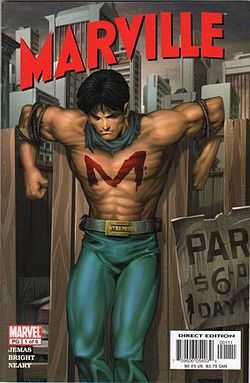Marville (comics)
| Marville | |
|---|---|
 Cover of Marville #1 Art by Mark D. Bright | |
| Publication information | |
| Publisher | Marvel Comics |
| Format | Limited series |
| Genre |
|
| Publication date | 2002 - 2003 |
| Number of issues | 7 |
| Creative team | |
| Writer(s) | Bill Jemas |
Marville is a 2002 comic book limited series published by Marvel Comics. The series was written by Bill Jemas, and the stories involve satirical comments on comic book industry conventions and trends.[1]
Overview
The main character is Kal-AOL Turner, the son of Ted Turner and Jane Fonda from 5002. Kal-AOL is sent back in time via a time machine made out of video game systems. Despite having no superpowers, he tries to be a superhero. After some adventures as a Superhero, he and his friends decide to use their time machine to travel back to the origin of time and talk to God. Jack (who is never definitely stated to be God) takes Al and his friend through the times of the dinosaurs and neanderthals, explaining the origins of life and bestowing the secret of world peace to Al in the process. Al tries to have his story published as a series of comic books to share the secret of world peace, but is rejected because his story is not about superheroes or action.
The title is a reference to the TV series Smallville; the cover of issue #1 features the main character tied up as a scarecrow with a red 'M' painted on his chest, much as Tom Welling is in the first episode of Smallville and in related publicity material.
The series revisits several existing points of Marvel continuity in a completely irreverent and contradictory manner. For example, the issue titled "Originville" (referencing Origin) visits a prehistoric setting in which Wolverine is a mutant Neanderthal. Despite this, the series' main character, Kal-AOL Turner made a cameo appearance in the Marvel Universe series GLA and received a profile in The All-New Official Handbook of the Marvel Universe A to Z.
Issue #3 consists entirely of art with the separations, with the script superimposed over it.
The final issue of Marville, issue #7, does not actually contain a story; instead, it contains the submissions guidelines to Marvel's new Epic Comics imprint.[2]
U-Decide
Marville was created as part of Marvel's U-Decide event, in which fans would decide which of three books would survive. The event involved one existing book (Peter David's Captain Marvel, whose numbering was restarted at issue #1) and two new books (Marville and Ron Zimmerman's Ultimate Adventures), and was based around a bet between David and Jemas, of which Marvel editor-in-chief Joe Quesada later became a part. Jemas changed the stakes of the bet a few issues into Marville, stating that the loser would take a pie in the face for charity. Despite this, both Marville and Ultimate Adventures ended fairly quickly, while the rebooted Captain Marvel would last three more years and 25 more issues, for a total of 60 issues when combined with the first run.
Reception
The series has been panned since its debut.[3][4][5][6]
References
- ↑ http://books.google.com/books?id=npIsZV7grboC&pg=PA144&dq=marville+comics&hl=en&sa=X&ei=r90cUZvmNOmKiAK5t4C4Ag&ved=0CE0Q6AEwBQ#v=onepage&q=marville&f=false
- ↑ http://books.google.com/books?id=fF0XachOwyYC&pg=PT643&dq=marville+comics&hl=en&sa=X&ei=r90cUZvmNOmKiAK5t4C4Ag&ved=0CD0Q6AEwAg
- ↑ http://4thletter.net/2009/03/the-marville-horror-part-1-better-sales-through-self-immolation/
- ↑ http://comicsalliance.com/the-15-worst-comics-of-the-decade/
- ↑ http://atopfourthwall.blogspot.ca/search?q=Marville&max-results=20&by-date=true
- ↑ http://www.spiderfan.org/comics/reviews/marville/001.html